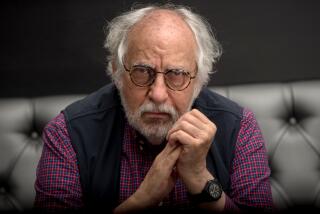TV REVIEW : ‘Proust’ Gets Lost in the Translation
- Share via
Harold Pinter’s massive screenplay adaptation of Marcel Proust’s novel “Remembrance of Things Past” remains unfilmed. The 1991 British film “101 Boulevard Haussmann,” with Alan Bates as Proust, proved a tepid mirroring of the writer’s life and work. And the latest filmed Proust, “Marcel Proust: A Writer’s Life” (at 10 tonight, KCET Channel 28; 8 p.m., KVCR Channel 24), strives to capture a remembrance of Proust’s past in a fitful, sometimes ham-fisted way.
Proust should not have such an unhappy relationship with cinema. For an art form so naturally able to manipulate time and the shifting of past, present and future, Proust--world literature’s acknowledged master of the use of narrative memory to elicit powerful observations and descriptions--is a natural ally.
*
The critical moment in director Sarah Mondale’s biographical treatment, produced by South Carolina Educational Television, is struggling author Proust sipping a cup of tea and chewing a wafer, with a rush of childhood memories crashing in on his mind. This was the epiphany that triggered “Remembrance of Things Past,” his enormous 14-year project of more than 3,000 pages, a million words and about 200 characters. But Proust’s Proustian moment is shown here in a crude, brief series of jump cuts that poorly mimic the novel’s time linkages.
The film is paradoxically strongest in its early passages, coursing from commentary clips with writers Roger Shattuck, Iris Murdoch and everyone’s favorite Civil War observer, Shelby Foote, to archival footage to dramatic re-enactments to remarkable film clips of Proust’s friends remembering. Foote calls Proust “the man who hung the moon in my mind.” Turn-of-the-century scenes of the new Paris metro and beach-going revelers suggest a new world being born. Proust cohorts such as Jean Cocteau recall how Proust paid workmen not to work so he could write in peace, and Francois Mauriac can’t utter the word homosexual to describe Proust.
He was, but Mondale’s film does not make a great fuss of it. For the re-enactment scenes, she found a Proust look-alike in Joel Pommerat, and both her sense of tableaux and poetic moving shots inside Proust’s beloved Amiens Cathedral partly translate to film the novelist’s descriptive sense and belief in art’s primacy. Still, as graceful as Kate Nelligan’s narrating voice is, its inclusion only adds to the flattening, “educational TV” effect of what becomes another failed film attempt to capture the essence of one of the first cinematic novelists.
More to Read
The complete guide to home viewing
Get Screen Gab for everything about the TV shows and streaming movies everyone’s talking about.
You may occasionally receive promotional content from the Los Angeles Times.






